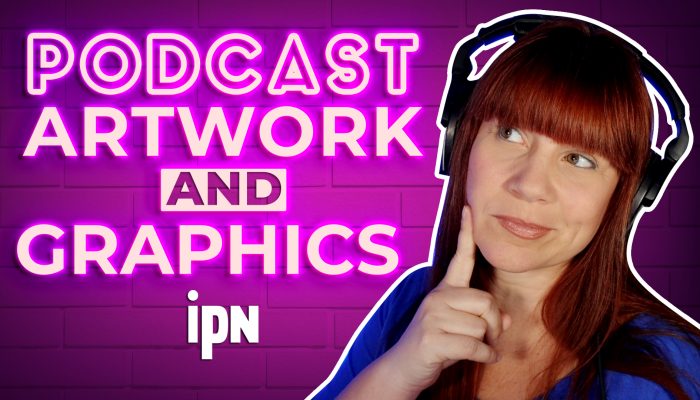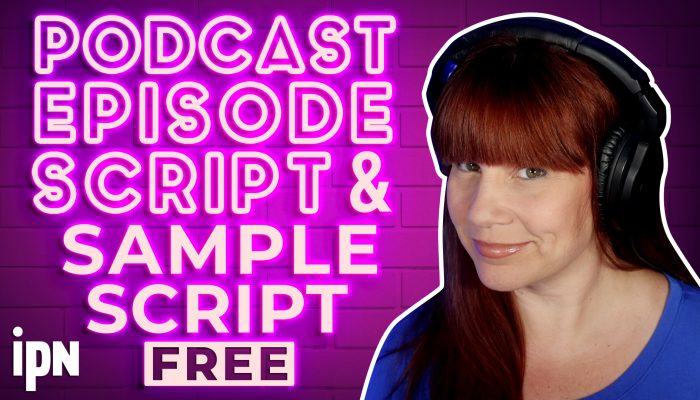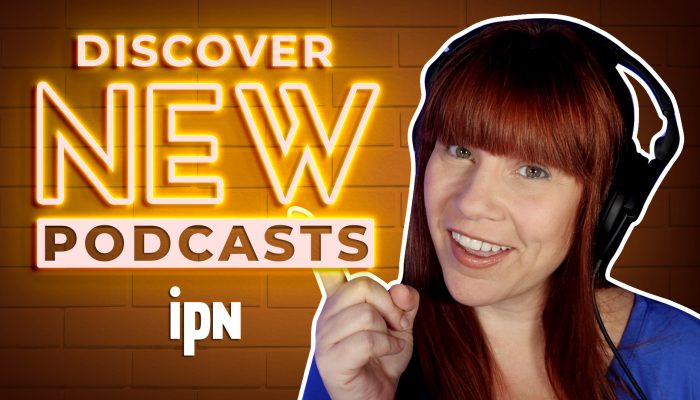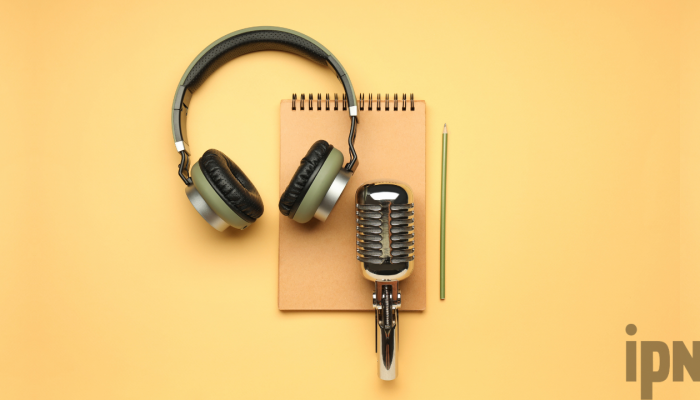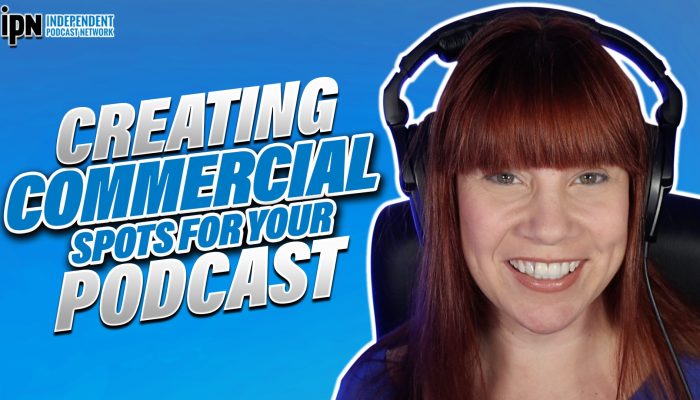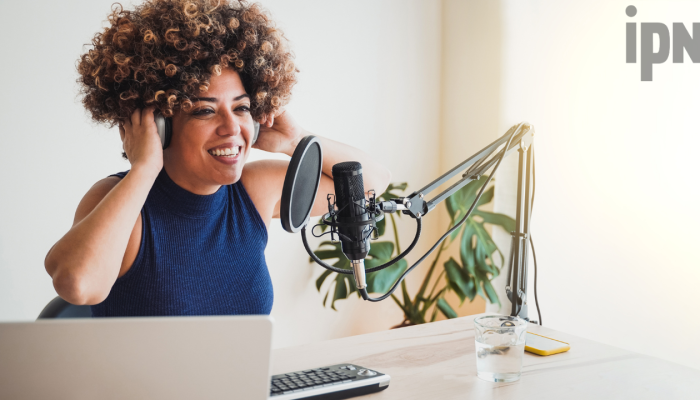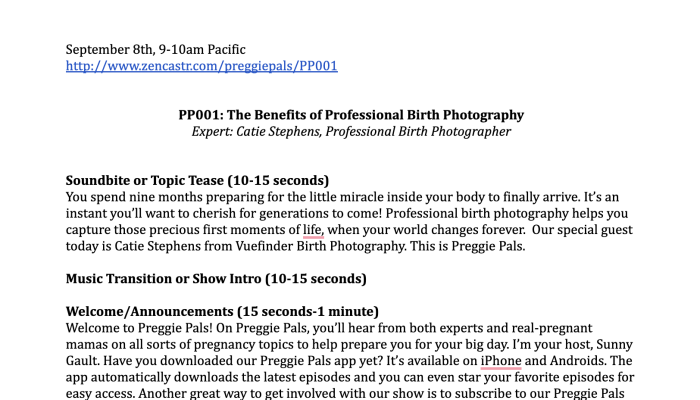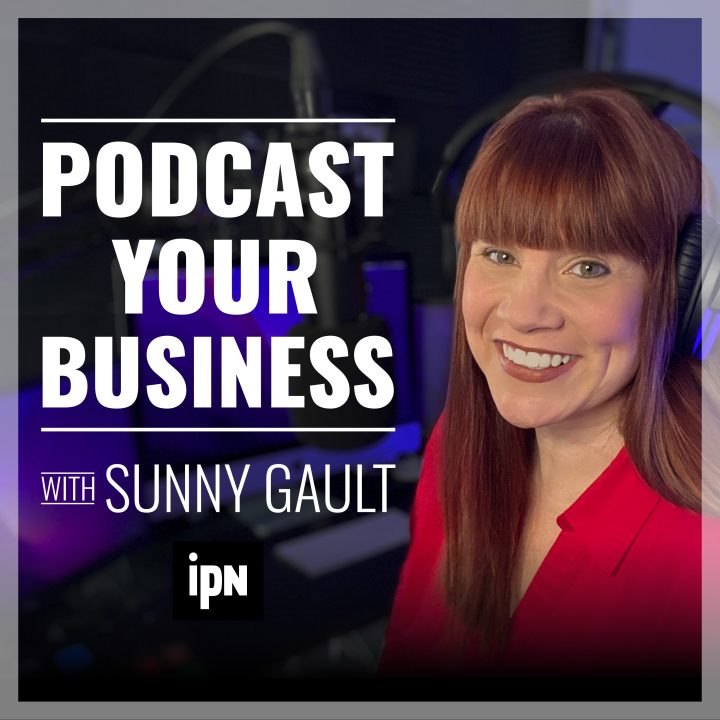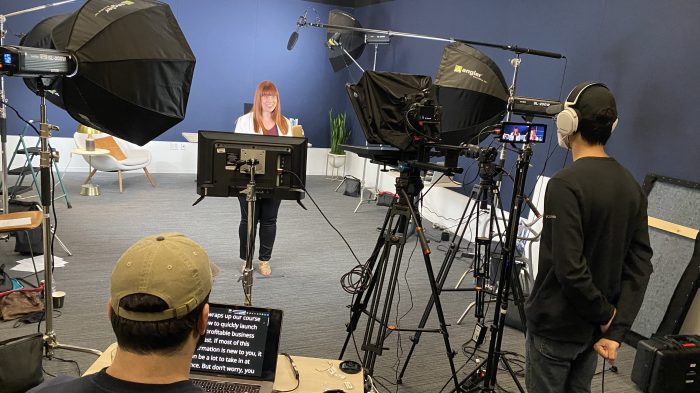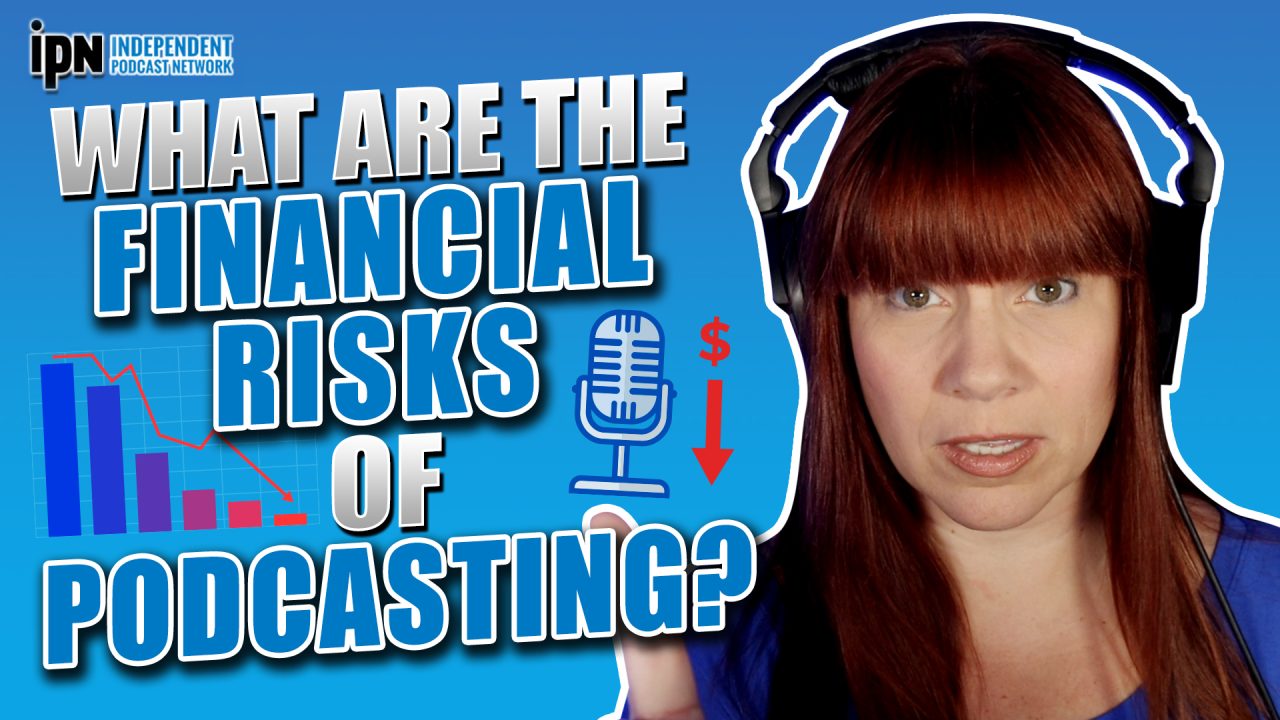
Know what to expect before you start your podcast
Before you commit to this whole “podcasting thing”, it’s a good idea to really think about the financial risks. You need to know what to expect so you don’t get in over your head financially. That will probably be the death of your podcast and it could also cause all sorts of other problems. So, what exactly are you committing to money-wise with a podcast? And what can you do to mitigate those risks?
Here’s what we’re going to discuss…
- How do podcast financial risks compare to other forms of media?
- The different phases of podcasting
- Breakdown of common podcasting expenses in each phase
- How can you mitigate financial risks in podcasting?
keep more of your money!
Here are some great ways to avoid podcasting pitfalls causing you to lose time and money.
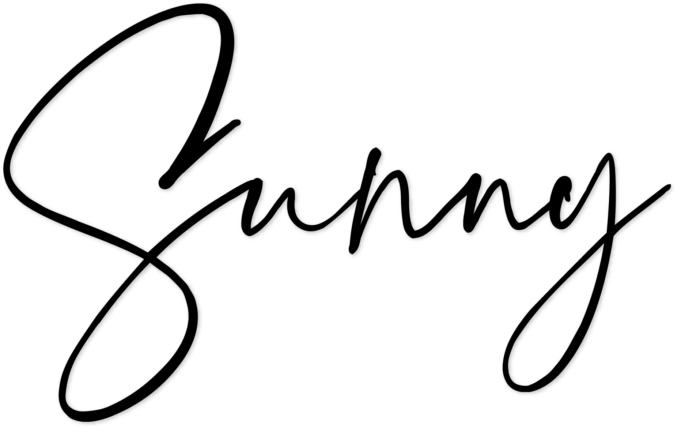
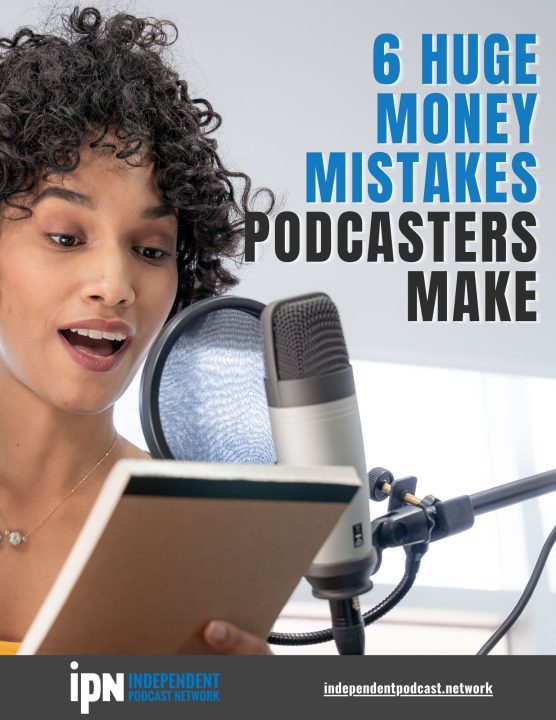
Episode Transcript
0:01
Before you commit to this whole podcasting thing, it’s a good idea to really think about the financial risks, you need to know what to expect. So you don’t get in over your head financially. That would probably be the death of your podcast. And it could also cause all sorts of other problems. So what exactly are you committing to money wise with the podcast? And what can you do to help mitigate those risks? Take it away, Mr. radio man. Podcast Your Business.
0:41
Yes, I am ready. Are you guys ready? Welcome to another episode of Podcast Your Business. I’m Sunny Gault. I’m a podcast coach. And I also mentor podcasters. And I’ve been doing this whole podcasting thing for more than 17 years. I’m also the founder and CEO of a company, which you really should check out. It’s called Independent Podcast Network, you can find us at https://independentpodcast.network. And we put out a ton of free content for new podcasters are podcasters that are interested in growing their shows. And then if you’re ready for monetization, we work one on one with podcasters and find advertisers that are a good fit for them. But today, I’m here to help you create amazing podcasts. And we tie this into your business. But if you’re just producing podcasts just for fun, or it’s not connected to your business, and you want to create a business, we can help you too. So we create these amazing podcasts by mastering the five P’s of broadcasting. That’s right, the five P’s are prep, plan, produce, promote, and profit. So when I was creating my first podcasting course, which is available for free on our website, if you guys want to check that out, I thought about what does it take to create a successful podcast, and that’s when I created the five P’s of podcasting. If you can master these five P’s, then you’ve got a successful podcast. And so in our episodes for podcast, your business, we focus on something that falls into one of those peas. So Mr. radio man, which of the five P’s are we talking about today? Prep. Yes, I’m so excited. We hardly ever do episodes on Prep. Because really, a lot of that is internal stuff that you have to figure out. But looking at the finances of podcasting, definitely falls into that category, right? Because that’s an important decision that you’re gonna have to make. And yeah, if it’s going to cost too much, or there’s too much risk involved, you may not want to even go down this podcasting path.
2:45
So here’s what we’re going to talk about. In today’s episode, we are going to talk about how do podcasting financial risks compared to other forms of media? Because we need some perspective here. Yes, the episode is going to focus on podcasting. But if you didn’t do that, what else would you do? Right. So that’s the big view. Next, we’re going to talk about the different phases of podcasting. Because as you produce your show, your show is going to go through different phases. And then in those phases, there’s different financial risks. So we have to know what the phases are first, and then we’re going to break down and show you what the common podcasting expenses are in each of those phases. And then finally, we’re going to wrap things up by talking about how do you mitigate this, right. Obviously, people don’t want to waste money, that doesn’t make a lot of sense. So what areas have I found that you can minimize those risks. And then I’m also going to give you kind of my game plan. So when I go into producing and creating a new podcast, I don’t want to spend a lot of money. I’ll be honest, you know, I don’t have podcasts that have million dollar budgets, or even $100,000 budgets. So I’m always thinking about the financial risks. So I’m gonna give you my breakdown of what I do when I go into a new podcast, because I’m always trying to mitigate any of those things that would cause my bank account to go further and further down. I’m sure you guys can relate. All right, well get started with all that right after this quick break.
4:20
So doing anything new can feel a bit risky, right? Such as starting a new podcast, this is something new for most people have in the beginning. You’re not entirely sure this whole thing is gonna work out. You hope it does, but no one really knows right? And like I said, no one wants to waste money. So let’s go ahead and dive into this. Let’s get into the finances of podcasting so you know what to expect. First, I want to provide kind of the 30,000 foot view here. Yes, we’re specifically talking about podcast, financial risks. But if you didn’t do podcasting, what else would you do? So we have to look at other forms of media. And this is specifically for those of you that are like, Oh, my gosh, I’ve got a voice. I’ve got to get information out there somehow. So basically, you’re determined to do that. But you’re not really sure. Well, is podcasting, the right thing? Are there other things that I should consider? Alright, so when I think about what most of us have access to do, I think about these different, you know, media forms of media, okay, you’ve got blogging, which nothing wrong with blogging, I think blogging is probably a little bit more simple. I don’t mean that in a bad way. Because sometimes simplicity is better for people. You know, when you’re blogging, you’re writing, you may have a website, you might need, you know, some resources if you’re going to do photos and things like that. But you don’t have the audio component or video component to go along with it. Okay, so I think, you know, when we talk about people like us, average, everyday people wanting to get the word out, somehow, blogging makes a lot of sense. Now, there are a lot of blogs out there, those are the things to consider. Sometimes it’s hard to make a name, especially in today’s society when everything is audio and video, but that’s a possibility. I feel like podcasting kind of comes in between blogging, and the next thing we’re going to talk about, which is video, and YouTube specifically, okay, because that is the 800 pound gorilla in the video space. If you’re going to add video, you are going to add to your financial risk, because there are a lot more things that you have to consider. And with, you know, creating something for YouTube, it really does need to be video, I know there are a lot of podcasters that have an audio podcast and just put that up there on YouTube with a static image or whatever. Not a huge fan of that. I think the stats show that that doesn’t really work. Okay, so if you’re going to do YouTube do it right. But you’re gonna have to think about, you know, your equipment is totally going to change, you got to think about lighting, you got to think about location and your background, and a whole other, you know, host of things that we’re not going to really get into today. But it’s more complicated than just doing an audio podcast.
7:18
And then we have, I’m just going to group kind of mainstream media into, you know, this category, we’ve got radio and television. Now, historically, that has been paid to play. And there are a lot of things, especially nowadays, a lot of censorship, stuff that you’ve got to deal with, that you don’t have to deal with, in you know, some of these other forms. And you have to have money, you guys, I don’t know if you’ve ever looked into the rates, because some radio stations will allow you to, hey, I want to do a radio show. Some will allow you to buy the airtime and you just create your show, and I’m sure they’ve got some standards or whatever. And you could probably do that. There are some podcasts out there that are also on the radio. Television is even more expensive. When you’re talking about financial risks. I can attest to the fact that they are hundreds of 1000s of dollars per episode, normally. Real quick story before I really got into podcasting, I was thinking about doing a show for local television here in San Diego. So with our local television affiliates, I do come from the news background. So I’m you know, used to producing things and doing a lot of stuff on my own. I’m very creative. And so I did what’s called an oto a one time only, and I created a television pilot that aired here in San Diego. And it was so what’s the word I want to use? It was a huge challenge to put together just one episode. And this was with a shoestring budget. I mean, most people are just volunteering their time, I happen to have the resources to be able to get it up on TV. So we didn’t have to pay for that. But just getting an hour long show together, you know, having the people that were going to be on camera and the segments that we were going to do. It was crazy. And it really didn’t go further past that initial pilot, not because I didn’t want to do it because I realized how much more financing we are going to have to come up with somehow in order to do it. And, you know, I started to go down that path and look for sponsors. And you know, again, you’re talking about, let’s say 10 episodes, but each of the episodes are anywhere between like $50,000 or $100,000. That is a lot of money. Okay, so I speak from experience when I say yeah, I guess you could do radio and TV but not quite for most of us. Right? That is a whole other beast and especially if you’re thinking about doing this for your business. Your focus is on your business, not in starting you know some You know, huge $100,000 Plus production. So how does podcasting compare to those? Like I said, I think blogging is the only one where it might be a little bit more simple than podcasting. Everything else is just, it’s pretty big. You could probably do YouTube, if you feel comfortable with video, but the radio and TV, it’s not really an option for most of us. Okay, then you’re talking about huge financial risks. So if you are one of those people who’s like, I have to create content, how am I going to get it out there, I think the first three make more sense, you could blog. If you’ve got some good writing skills, you could podcast, which I think a lot of people are, you know, based on the equipment that’s available today, and technology can do fairly easily. And then there’s another step, if you want to add the video, you could do YouTube.
10:52
But let’s now focus on podcasting. Okay, because we have some different phases that podcasts go through. And you know, if you know a little bit about my background, you know that I have a history of not only helping other people start their podcast, but also just kind of playing around in this space, I’ve started many shows, not of all, which are still up and running today. And I am perfectly fine with that. Because every time I launch something new, I learn something. And I bring that information back to you guys. So I view this as a big sandbox that I play around with. And I can do that because I make sure that there’s not huge financial risks to the podcasts that I’m setting up. So let’s talk about the different phases of podcasting, you have what I call your startup, you’re in startup mode. And honestly, those are where you’re going to have some of your largest upfront costs, something you’ve got to pay for all at once or within a shorter period of time. So that’s your first phase, then you have what I call your growth phase. Now you’re always trying to grow your podcast. But this is when you’re really kind of testing the waters, okay. And you don’t have those startup costs anymore, because you’ve created some stuff, and you can reuse certain things. But you do have consistent costs. And then this is also the stage at least where I do some trial and error. Because as you’re trying to grow your podcast, you’re trying to promote it, you want to get the word out there in many different ways. And depending on what your podcast is about, you may try different ways to promote it. And a lot of that’s just trial and error. Okay. And then the third phase is more of your monetization phase. That’s when your show is a little bit more established. And you’re focused more at that point on balancing your profit versus your expenses. So that’s when you can kind of play around, you know, once you start making a little bit of money, you can play around and maybe upgrade your services a little bit or add some things on. But obviously, it has to make sense with how much money you’re bringing in. Okay, so now let’s break down these different phases a little bit more. And I want to talk about some of the specific costs that you’re going to have in each of these phases. Again, we’re just trying to provide an overview. So you understand the financial risks of doing a podcast. When we talk about starting up a show, this is your launch for your podcast. And like I said, this is where you’re going to have some of your largest upfront costs. I did an episode for podcast your business as one of the first few episodes I did about how to start your podcast with a budget of $250 or less. I stand by that. So this can be done for pretty cheap, especially when you compare it to like radio and TV and things like that. And I think that’s the beauty of podcasting. You know, being able to anyone, you know, I read this, I don’t even know if it’s true, to be honest. But it sounds great. I read that Steve Jobs because podcasting comes from the iPod, right, which was an Apple product. You know, I don’t know if they make them anymore. But I read that Steve Jobs had this idea of media being able to be created without all the hoopla. That’s the technical term, right? The pay to play like radio and TV. And he had this vision for it. And this is why I know Apple has done some different things lately by offering memberships and stuff, but this is why podcasts are free. It shouldn’t cost an arm and a leg. Can you spend that much? Yeah, you can just with any kind of project, you can go way overboard and then be in the hole and then you know, start pulling your hair out. But we don’t want that for you. Right.
14:44
So what are some of the initial startup costs that you have to consider? First is your equipment which you really don’t have with the blogging thing, right, which is why I said that’s probably a little bit more simple. At the very least you need to have a good microphone, that does not mean that you have to spend hundreds and hundreds of dollars, you can find good stuff out there. Like I said, Tech has come a long way. We have blog posts and different resources on our website. If you want specific, you know, products to look at, you can just, you know, go to our website and search for it independent Podcast Network. So we’re not going to get into specifically what equipment to buy. But that is something that you have to consider in the very beginning. This is why your costs are a little bit higher when you’re starting up a podcast. But you don’t have to go overboard. There’s a lot of equipment out there, and it looks really shiny and pretty. And some of it has fancy glowing lights on it. But really what you need is a simple microphone, that you can plug directly into your computer. So you don’t have to have a ton of extra equipment, you also have to have a podcast host. And this is like a website host. For those of you who have websites for your business, you have to host it somewhere. Do not host your podcast with your website host, they’re not going to give you the stats and information that you’re going to need. And they also don’t follow the IAB compliance. If that’s important to you, I’ve done an episode on that as well, okay, but the IAB creates standards for how episodes, you know, the numbers behind the downloads and things like that just to make it consistent across various podcast hosting platforms. So if that’s important to you, then you need to go with a regular podcast host. And I recommend that you start with a free plan. There are different providers out there. And I have information on the website about that too. But start with the free plan, don’t let them insert ads, you know, don’t make it a trade where, hey, it’s a free plan. But we’re gonna just insert these ads wherever we want. No, you need to have control over your content. But there are different resources out there that allow you to do that. So that’s your podcast hosting gotta have it. Then for graphics, your main startup cost is your artwork, which I’ve done episodes on this to really important that just spend a little bit of money doesn’t have to be a lot. You know, some people will do it for like 510 bucks on Fiverr. I don’t necessarily trust that. But you could get it for 50 bucks, probably somewhere, you know, somewhere in that area. But invest unless you are a graphic designer, please hire someone else to do this. Okay, this is like the cover for your book. And many people may not click on your podcast if they don’t like your podcast artwork. So invest in that other graphics to consider sometimes people do different thumbnails or you know, different graphics for each episode. You don’t have to do that. It’s not mandatory. I do that for Podcast Your Business, because I know that I’m going to take that content, put it on the website. And I need, you know, based on the format of how things look on the website, I need a nice thumbnail. But if I didn’t have that, and I was just you know, maybe I didn’t even have a website for my podcast, then I probably wouldn’t change up the, you know, the thumbnails for each episode, I think that would be an extra expense that I would just leave out. Let’s talk about editing for a second. When it comes to editing, could you edit your own stuff, maybe if again, if you don’t have any experience doing this already, the technology is there to make it easier and easier. But I’m all about simplifying things. If you’re going to invest anything that’s a little bit more long term with your podcast, I think editing should be it. Don’t stress out about this, there are good resources out there, it is probably going to be your most expensive cost for your podcast. That’s just kind of how it is. But there are resources out there that are fair that are reasonable. And then you just get it off your plate and you know that someone else is going to do a really good job because that’s their area of expertise. So don’t freak out about that. Also, you could have an outro or intro sometimes your editor will just kind of do that for free. Sometimes it’s a you know, an extra cost. But that’s really just part of your startup and those that’s really your costs to start up a podcast.
19:11
Now let’s talk a little bit about the next page phase, which is growth. So you’ve already launched your show. This is where we get into those consistent costs that you’re going to see month after month. So if you took my advice, you have a free podcast host, then that continues to be free. You don’t have to pay for that. And you could be in this growth phase for a while, which is why I say listen, if you don’t have to pay for something, don’t pay for it. I do think that it is important if you’re thinking about the next stage, which is monetization, if you want to make money with your show. It is important with the format for your show that you figure out if you want to do commercials and promos and things like that. You need to think about where those are going to go and you So from the very beginning, even in the startup phase when you’re thinking about your format, now, the free podcast hosting platforms out there aren’t going to let you add what we call add markers, so that you know exactly where those spots are. And you could run an ad in those spots, that’s going to be something you have to pay for. But what I did in the beginning with my podcasts is I had them on a very inexpensive platform, it wasn’t free, but it was very inexpensive, I would still create my episodes, I would know where the ads are going to go. And I would write down the timecode for where those ads hit, even though I wasn’t at on a platform where I could utilize that technology. That’s what I recommend podcasters do, if you don’t do that, then when you’re at the next phase for monetization, it is going to cost you more money to go back into your episodes and find those spots. So don’t do that in the beginning, like make sure that you know where those spots are, just have a Google sheet that has the time codes on it for where those spots would hit. And still stick with the free plan. Okay. You may still have your graphics, okay? Which that’s really only if you’re going to do the thumbnails per episode, because you already have your artwork. So you might even be able to cross that off your list entirely, you’re still going to have editing, you know, and I also lumped music into editing, if at all possible, really good way to save some money is to work with an editor that already has access to a good database of music. And they incorporate that into your fee. Okay, per episode that you pay. Otherwise, you are going to have to have a some sort of subscription, which they’re not too bad, and pricing, I use sound stripe. And yeah, it’s really reasonable. I can’t remember what it is off the top of my head, but I can download as much music as I want. And it’s the same, it’s a flat rate. But you know, if you don’t need that, for other purposes, see I do videos, I do a lot of other things. So I can justify that cost. If you don’t have those other kinds of projects that you’re working on, then see if you can lump that in with your editor, see if your editor can just add music. And the other thing I think you add into the cost in the growth phase is podcast promotion, you really think about, okay, I need to grow my podcast, where do I promote it? How do I promote it? Again, this is the trial and error that I was talking about earlier. Now you could pay someone to do this, because I’m assuming you’re a busy person, you may have your own business, you’ve got other things, maybe you’ve got a family, you’ve got a life outside of podcasting. So maybe you want to pay someone to do that, that could be an added cost, or just sweat equity, right? You are doing the research yourself, you’re sending out the emails yourself. As far as what this entails podcast promotion, this could be posting on social media, this could be running ads on different platforms, this could be reaching out to other podcasts for podcast, cross promotion. So that is an added thing to consider. Like I said, you don’t have to spend a lot of money in this if you’re willing to do it yourself. But time is money, right? So you got to factor all of that in. So that’s the second phase.
23:28
And then finally, we’re at the monetization phase. One thing that I want to say off the top with monetization is if you are selling your own products and services, you can get started with that right away. In fact, I always tell people, like even in the startup phase, as you’re working on the format for your show, this is your own stuff, which you may already have produced, you’re just incorporating it into your podcast. Well, it doesn’t cost any additional money to mention that, as you’re recording your show. And these are products and services, you are probably always going to want to promote. So you don’t have to worry about it going stale or anything like that are no longer offering those services per se, right. So that’s something you can do in the very beginning, when I’m talking about monetization, now I’m talking about prepping your show and getting ready for advertisers and working with them. So again, we still have podcast hosting, but at this stage at the monetization stage is when I recommend that you upgrade. And you can either upgrade on whatever platform you’re already on. So maybe they’ve got a free version and you can go to a paid version. What you’re looking for here are analytics and the ability to do dynamic ad insertion, which I am a huge fan of, and I’ve talked about that in a lot of episodes. It may require you to change podcast host providers, if that provider doesn’t offer dynamic ad insertion or the stats that you feel like you need okay, but if you’re going to start selling things You know, specifically working with advertisers, they need to know, you know what your stats are. And a lot of, you know, the free platforms are not going to give you a ton of stats. And you really only need that, by the way, for the most recent 30 days, is what most advertisers are looking for. So don’t worry about not having your whole history or whatever, because you need to change podcast host providers, not a huge deal. Okay, you’ll, you may still have your graphics depending on whether or not you’re doing that, you know, for every episode, you stop your editing and your music, you may have more podcast promotion. Now let’s talk a little bit more about advertisers, I feel like this is, you know, the whole ad coordination, it’s more time that you’re gonna have to spend as opposed to money again, unless you hire someone else, because it becomes too much. Because this really is a separate job. You’ve got everything, you know, depending on whether you’re working with a third party company to find you ads or not, but you could be coordinating the deals, you know, you could be reaching out to these people, you could be sending over contracts. And then once the campaign starts, or even right before the campaign starts, you’re going back and forth with ad components, they may want to approve the ad, there’s a lot of back and forth, then you’ve got the actual campaign and how it plays out, they may want information on how the campaign is going. So maybe you’ve got to send them screenshots or different things like that. And then you’ve got the payment coordination, right. So you’ve got to come up with some sort of system for that, if you don’t already have, you know, that going on for you. And it’s important to know, since we’re talking about finances, that it can take three months or more to get paid for a podcast campaign. A lot of times, what I do is I invoice every month, like let’s say it’s an ongoing campaign. So I won’t just invoice at the end of the campaign, but I’ll invoice on a monthly basis. And that will definitely get you you know, paid sooner than if you waited to the end. And also the more people that are involved in these campaigns, the longer it’s going to take for you to get paid, it can be kind of painful, right? I said at least three months? Well, let’s say there are multiple ad agencies involved? Well, it’s going to take at least three months for the first person to get paid. And then you know, they only process stuff on the 15th of the month. So you know, so it’s going to, you know, be at least x amount of time for them to send out the payment to another company. And finally, the podcaster, you are the last to be paid. So that’s something else to consider as part of this whole financial process. Because if you’re spending money, you want to make sure you can get money as well.
27:42
Okay, now, I know we’ve been talking for a long time, this is a little bit longer of an episode than I thought it was going to be. But really quickly, I want to go through different areas where you can mitigate financial risks and podcasting. Now, you really got to look at this as a business, right. And if you are familiar in the business world, there’s something called an M-V-P, which is not a most valuable player, it is your minimum viable product. Which means that is the minimum product that you can launch with. Now, don’t view this as a bad thing. This doesn’t mean that you’re putting crap stuff out there. I like to look at it like this, what is the minimum that I can do to create a great podcast? Because again, you can spend a ton and ton of money, but you don’t have to. So what I want to do now, there’s a lot of different ways to do this. So I’m just going to share with you my mindset when I launch a new show, and the things that I’m usually committed to take it or leave it this is just kind of how I see things based on my experience, which I’ve been doing this, you know, for a long time, right? So first, I would commit to just doing an audio only podcast and wouldn’t even think about video. Again. There’s other fees and everything associated with that. Don’t even worry about that. I would commit to doing it for one year. If I’m doing weekly episodes. Now that’s just me, you may say there’s absolutely no way I’ve got too much of my plate, I can only do X amount of time, think about what your maximum time is that you can fully commit to maybe that’s only six months, maybe that’s three months, whatever it is, I would personally commit to one year because that gives you an overview of the different seasons, the ebbs and the flow so you can really see you know, what you’re looking at here. I would purchase this is assuming that I’m brand new to podcasting. I would purchase a solid microphone that can plug into my computer. And that same microphone must work on my iPhone as well whatever phone you’ve got, because you never know when you need to be on the go. Maybe you want to do remote podcast somewhere in your you know at an expo or something like that. But it could also be the You’ve got to travel for other reasons. And you don’t want to bring a bunch of technology and you know, gadgets and stuff with you. So find a good one, you can upgrade later, okay, I’m just talking about what I would do my minimum viable product, I would create a hosting account, I am partial to anchor, which is now part of Spotify, they have a great, you know, really easy way to create an account and they don’t, you know, run ads on your show, you know, all that extra stuff that you don’t want with a free account, I would do exactly what I told you before, I would really look at my format, I would leave spots for ads, I create a Google Sheet, you’re not going to have the technology to be able to put those ad markers in yet. But that’s there’s nothing stopping you from going through that same process and just pausing for a second and marking that time code. So when you are ready for ads, you are all set, I would take my RSS feed, I would publish it to as many destinations as possible, which is really easy to do. I’ve got even a one sheet that goes through the main sites, because a lot of them are based on Apple podcast. But there’s a few other that you can publish to. Because you want people to find your show, regardless of where they’re at. You don’t want them to have to go searching for your show. So be in as many destinations as possible. I would hire an editor, hey, I have edited more than 500 podcast episodes, and I still hire an editor. Because I view my time has been very valuable. And yes, I could do it. And sometimes I do do it. Just to save time I actually episode I edit every episode for podcast your business, because the format is really easy. I just edited as I go. So it doesn’t even make sense to send it off to an editor. But some of my more advanced shows, Heck, yeah, I’m gonna hire an editor, I usually try to do things in bulk. So that’s one thing that I would recommend, sometimes editors, if you commit to sending them four episodes a month, they’ll give you a discount. And so that may be something that you want to look at with your editor, I would consistently publish my episodes, whatever I’ve committed to I’m going to do for that period of time I said, I’m going to do it for so in this case a year. And let’s say I’m going to do a weekly show, because most people listen, you know, their their whole schedule is based on things they do weekly, right. So I think that that’s a good consistency. For website stuff. If I had a business that this was connected to, I would just use my business website. And I would have a link in the main navigation for podcast and I would list my episodes there, I would not create a separate website for that that is more money more time, and you really don’t need it at this stage. I would use whatever social media channels I had, I already had, I wouldn’t create anything new. If it’s connected to your business grade, maybe you can use some of that momentum and you know, people that already follow you for your business. And I would promote my episodes on those social media channels. I would also join online groups that focus on podcasting. So I can learn from them. And a lot of times in those groups, too, there’s opportunities to cross promote. And you can do that for free. So join those groups, because you’re gonna learn a lot. And then I would repeat this whole process, I would keep doing this until my podcast became financially stable. And what I mean by that is I get into a rhythm with all of this. And then it grows to a stage where I can start incorporating ads. And there’s a whole process for that. So we’re already kind of going long on this episode. But that’s where I think a lot of you fall right now, you’re kind of kind of you may feel like you’re in this no man’s land, or how do I get to that monetization stage, I’ve just given you a blueprint for doing that. And I’ve done that with multiple podcasts. The key is having good content, and being consistent. And if you feel like you’re in a place where you’re just gonna throw in the towel and do what we call podfade, which means they were there one day, and they’re not there. Now what happened, oh, they podfaded. They’re not doing their podcast anymore. Before you stop, please listen to me, please meet with a podcasting coach. Have them review your show and have them make recommendations, because they will probably see some glaring things that you have not even considered, because that’s their area of expertise. And I promise you if you do that you are going to be successful with your podcast. Does that mean it is going to have millions of downloads and you’re going to make all this money from sponsors? No, not necessarily. But if you come into into this with the right heart and the right intention, you never know what’s going to happen. It may not really be about this podcast, it may be that you have a guest on your show that leads you toward this whole other area that you never would have discovered another business opportunity you just don’t know. But if you didn’t do your podcast, and he didn’t stick with it mitigating your financial risks along the way. You never would have found that opportunity.
35:07
All right, as we wrap up today’s episode, I do have a free handout for you. It’s called “Six huge money mistakes podcasters make” since we’re talking about finances today, I thought this would be a good one to share. So I will include the link to that in the description below. We have a ton of free resources on our website at Independent Podcast Network, including blog posts, more podcast episodes like this one. We’ve got videos, more handouts, everything is free. And if you’re brand new to podcasting, I have whole courses so don’t spend any money. Save all your finances. Just come to our website and you can learn how to podcast for free. Until next week, remember…. you should start a podcast!
